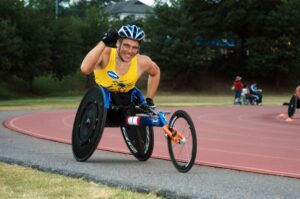Adaptive Sports: How Sport Is Becoming Accessible to People With Disabilities
Job Overview

Adaptive Sports: How Sport Is Becoming Accessible to People With Disabilities
Adaptive Sports: How Sport Is Becoming Accessible to People With Disabilities
Almost any type of physical activity can be adapted for people with disabilities, allowing them to continue playing old favorite sports or learn new ones, just as the melbet app is adapted for sports fans.
Participants in adaptive sports report improved quality of life due to personal factors (behavioral ability and health), community participation, and environmental influences.
Physical Activity
Physical disabilities or health conditions should not prevent people from reaping the many advantages of regular exercise. According to health guidelines, adults should get at least 150 minutes a week of moderate-intensity aerobic and strength training activity; unfortunately many people with disabilities don’t reach that minimum requirement due to barriers that exist in their lives.
One way of overcoming barriers is through adaptive sports, which are competitive or recreational sporting events designed for people with disabilities or impairments. They range from golf and skating, all the way up to cycling – each suitable for athletes of various capabilities or disabilities.
Adapted equipment in adaptive sports allows athletes with disabilities to perform the sport more efficiently and enjoyably than without modification, as well as foster teamwork, socialization, and a sense of community.
Adaptive sports offer many physical and psychological advantages, as well as stress relief. Accomplishing challenges through adaptive sports can boost self-esteem as well. While a person’s enjoyment and benefit of adaptive sports may depend on factors like their degree of injury/disability/fitness levels; generally, however, their effects are positive and well worth any efforts required to engage.
Socialization
Physical limitations due to injury, illness or health condition should never prevent you from engaging in healthy and fulfilling activities. From participating in your favorite sport or pursuing something entirely new, physical activity is vital in maintaining optimal health – it boosts energy, stimulates both brain and body, assists recovery goals progress while socializing with like-minded peers while increasing confidence.
Athleticians with disabilities can now participate in sports alongside those without one, thanks to adaptive equipment and facilities designed to accommodate various levels of ability. Not only is specialized equipment such as bright tape on balls for those with low vision available through adaptive sports programs; also included are changes to rules and regulations of games in which these athletes take part.
Modifications may allow visually impaired athletes to use shorter long jump distances, and wheelchair racers to shoot archery targets using a shorter bow and longer arrows. This enables the individual to focus more on their athletic ability rather than on their disability, which often is the source of shame, guilt and low self-esteem.
Self-Esteem
People who engage in sports report increased self-esteem. This may be the result of reaching goals, bonding with teammates, or simply feeling satisfied by accomplishment. Positive feelings such as these can also help alleviate depression and anxiety; additionally adaptive sports provide disabled individuals with meaningful ways to connect socially through active participation.
Adaptive sports are tailored specifically to individuals with specific disabilities. For instance, blind archers may use an audible bow to aim at targets and compete in tournaments alongside their sighted peers; similarly, visually impaired athletes are able to participate in 5-a-side football with balls that emit audible sounds when touched.
Although many barriers must still be overcome, such as awareness from those without disability of how to accommodate disabled participants and insufficient funding for accessible facilities, research has demonstrated that mainstreaming disability sport into society can foster positive attitudes about disability while encouraging greater participation by people without a disability in mainstream sports programs thereby dismantling ableism barriers. This is especially vital because an inactive lifestyle poses risk both physically and cognitively disabled people – an increased sedentary lifestyle can cause poor health outcomes in both groups – making integrating disability sports an integral part of society.
Mental Health
Adaptive sport provides athletes with disabilities an effective means of building both confidence and self-esteem. They can compete against peers with similar abilities, creating an inclusive community experience. Furthermore, adaptive athletes can feel accomplished despite physical challenges they may encounter and find the motivation to push past their boundaries.
Adaptive sports are expected to grow increasingly popular, due to their potential fitness benefits for people living with disabilities. Nearly any sport can be modified to meet an individual’s disability – for instance archery can be modified so as to accommodate blind participants with special bow and arrow sets; skiing can be enjoyed by those with visual impairments using sighted guides; while martial arts classes can even be offered to people who have intellectual disabilities.
Even with these promising global trends, disabled people still face many barriers when engaging with sport. These include lack of awareness from those without disabilities about how to include disabled people in sporting events; inadequately accessible facilities; and negative social attitudes which lead to isolation and lower confidence and self-esteem levels. Coaches should pursue professional development opportunities so they possess the skills required to incorporate people with disabilities into their sport programs.


